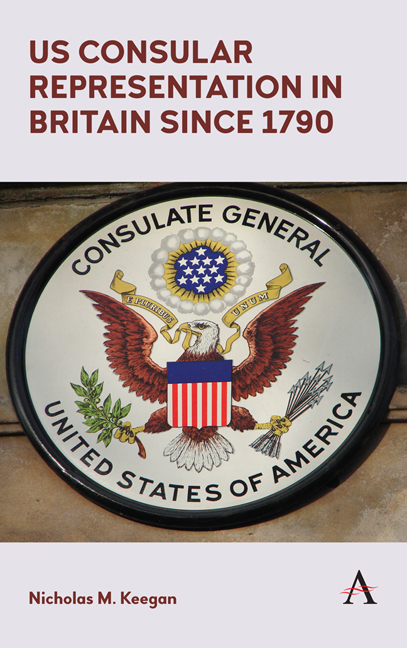Book contents
- Frontmatter
- Dedication
- Contents
- List of Illustrations
- Foreword
- Preface
- Acknowledgements
- Introduction
- PART 1
- PART 2
- Chapter Four US Consular Representation in Britain
- Chapter Five Impact of the Civil War and the Role of American Consuls in Britain
- PART 3
- Appendix: Locations and Categories of Consular Offices
- Notes
- Sources
- Bibliography
- Index
Chapter Four - US Consular Representation in Britain
from PART 2
Published online by Cambridge University Press: 21 June 2018
- Frontmatter
- Dedication
- Contents
- List of Illustrations
- Foreword
- Preface
- Acknowledgements
- Introduction
- PART 1
- PART 2
- Chapter Four US Consular Representation in Britain
- Chapter Five Impact of the Civil War and the Role of American Consuls in Britain
- PART 3
- Appendix: Locations and Categories of Consular Offices
- Notes
- Sources
- Bibliography
- Index
Summary
The American Constitution came into effect in 1789. On 4 June of the following year, the first nominations for consular appointments to Britain were made. These initial appointments were the forerunners of a network of offices that would eventually extend from the Orkney Islands in the north of Scotland to the Channel Islands off the south coast of England. The activities of the consuls brought new challenges for the Consular Service, many of them dealing with topics that nowadays would be described as personnel or human resource related. Later, consuls would experience the same dangers as the British population during two world wars. This chapter discusses a number of topics that taken together give a broad overview of the many different facets of American consular activities and life.
The Extent of the Consular Network
The first American consular appointments to Britain were approved by the Senate in June 1790. They were James Maury of Virginia as consul at Liverpool; William Knox of New York as consul at Dublin; and Thomas Auldjo, an Englishman, as vice consul at Cowes. Two months later, in August, Joshua Johnson of Maryland was approved as consul at London. However, Auldjo faced two additional hurdles. First, his nomination was postponed by the Senate because of initial concerns about appointing foreigners as consular officers – Auldjo was a British subject – but they gave their approval on 17 June. Second, his appointment was not recognized by the British government because there had never been a previous consular appointment in Cowes. Instead, it was intimated to him that if he were appointed to the nearby port of Poole his appointment would be recognized and the fact that he was living in Cowes ‘would not be noticed’. He was therefore reappointed to Poole on 24 February 1791. The honour of being first operational consul in Britain falls to Maury, who began reporting from Liverpool in September 1790, while Knox did not arrive in Dublin until November of that year. Johnson in London did not begin reporting until 2 November. By 1801, there were 16 consulates and consular agencies throughout Britain and Ireland. Numbers increased slowly and in 1859 there were 21, but only 13 years later, in 1872, they had increased by an astonishing 148 per cent, to 52.
- Type
- Chapter
- Information
- US Consular Representation in Britain since 1790 , pp. 51 - 72Publisher: Anthem PressPrint publication year: 2018

